Paul David Hewson, better known as Bono, has been the frontman not only for U2, the Irish rock band, but for The Rise Fund, the impact investing arm of private-equity giant TPG.
As recently as January, at the World Economic Forum in Davos, Bono was out front for The Rise Fund’s launch of Y Analytics, its impact-accounting spinoff, talking about taming the wild beast of capitalism. “We need to re-imagine it, remake it, in our own image and the image of this new generation coming through that really, really want their world back.”
That joint CNBC interview with his Rise Fund co-founder, Bill McGlashan, feels especially on point after McGlashan’s dramatic fall from grace this month after being indicted, along with dozens of others, in the Varsity Blues college-admissions scandal. “Every investment has an impact,” McGlashan said. “The question is, is it a good impact, a bad impact, something in between?”
In the latest episode of ImpactAlpha’s Returns on Investment podcast, the roundtable regulars try to unpack the layers and make sense of the meanings of the McGlashan debacle. Imogen Rose-Smith, an investment fellow with the University of California, pointed to Bono’s comments around the launch of The Rise Fund in 2016, when he famously said impact investing had become “a lot of bad deals done by good people.”
In contrast, in pitching The Rise Fund, Rose-Smith said, Bono effectively told investors, “Invest with these guys. They’re assholes. They’ll make you a lot of money” (some of Bono’s language was even more colorful, as you can see in this 2017 interview with the third Rise Fund co-founder, Jeff Skoll).
That kind of attitude points up that McGlashan episode may be more about private-equity as a whole than impact investing in particular, Rose-Smith said. (In full disclosure, Rose-Smith said the UC is an investor in The Rise Fund.) McGlashan, after all, has been the CEO of the $13 billion TPG Growth for much longer than The Rise Fund.
Rise Fund’s Impact Multiple of Money: A conversation with TPG’s Bill McGlashan
“This is a fundamental problem with the private equity/alternative investment asset management industry,” she said. “A small group of people have been paid an awful lot of money to manage the assets of public pension funds. They have become extremely rich and they live in a world that is very different than the beneficiaries whose money they’re managing. This inequality has only grown and become greater over time and these people function under different rules.”
Among hedge fund managers, “We call it the ‘Red Ferrari Syndrome,” Rose-Smith said. “When your hedge fund manager shows up driving a Red Ferrari, you knew they were no longer paying attention to your portfolio. Instead they had become a professional rich person.”
“In general, investors get too enamored, ironically, of the wealth of the managers that they have made wealthy and they don’t hold them sufficiently accountable,” she said. “That has to happen in all investing, including impact investing.”
Catch up on all of ImpactAlpha’s Returns on Investment podcasts on iTunes, Spotify, SoundCloud or Stitcher.











